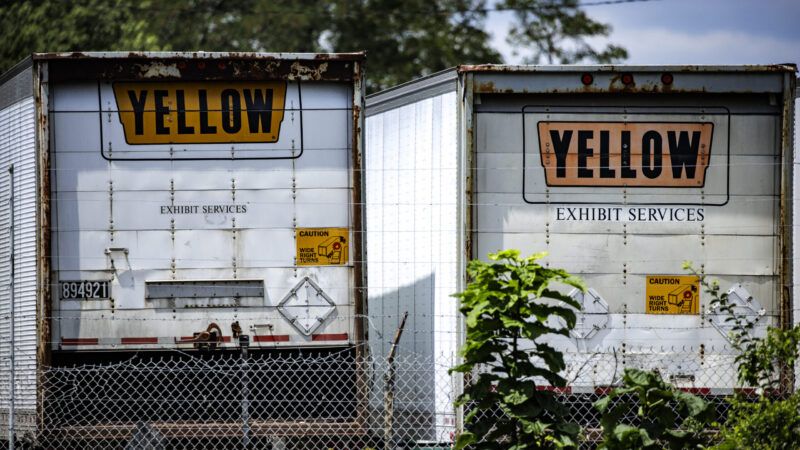Yellow Corporation To Close, Lay Off 30,000 Employees, and Likely Default on $700 Million Pandemic Aid Loan
The company blames much of its problems on the Teamsters trucking union's "intransigence," while the Teamsters say Yellow is delinquent on benefit payments.

Last month, Reason reported that Yellow Corporation, the trucking company formerly known as YRC Worldwide, was laying off employees and would soon file for bankruptcy.
In a Sunday night press release, the company confirmed that it had filed for Chapter 11 bankruptcy protection. It plans to "wind down" its business operations and lay off its 30,000 employees.
The majority of the press release blames the International Brotherhood of Teamsters (IBT) trucking union, of which 22,000 of the company's 30,000 employees are members. Yellow CEO Darren Hawkins criticizes the union for "literally driving our company out of business" due to "nine months of union intransigence, bullying and deliberately destructive tactics."
Yellow has spent much of the last year locked in contract disputes with IBT: The company claims that IBT leadership refused to sign off on Yellow's restructuring and modernization plans, which it deemed "essential to the Company's survival"; Yellow ultimately sued the Teamsters for $137 million. In internal messages seen by Reason in July, some employees blamed IBT for being laid off, with one writing "Thank you Teamster[s] for ruin[ing] our lives."
IBT, meanwhile, called Yellow "humiliatingly mismanaged" and charged that the company was delinquent on "contractually obligated payments to sustain critical health and welfare and pension benefits for workers." After news of the bankruptcy, Teamsters General President Sean O'Brien said, "Teamster families sacrificed billions of dollars in wages, benefits, and retirement security to rescue Yellow," including pay cuts in 2010 and 2011.
But the situation is more complicated than a disagreement between a company's management and its workers. In 2020, as countless companies struggled during the COVID-19 pandemic, Congress apportioned trillions of dollars to help both workers and companies survive the sudden economic blow. But hidden in that amount was a $17 billion fund under the Treasury Department's sole control, to be disbursed to companies deemed necessary to national security.
In May 2020, Sen. Jerry Moran (R–Kan.) petitioned then-Treasury Secretary Steven Mnuchin for help on Yellow's behalf; six weeks later, the company was approved for a $700 million loan, and in exchange, the government took a 29.6 percent stake in the company. The Treasury Department later explained that Yellow was "the leading transportation provider to the Department of Homeland Security and U.S. Customs and Border Protection." But at the same time, the Department of Justice was suing Yellow over allegations that the company overcharged the government by inflating its freight volumes. (The company settled the case in March 2022 for $6.85 million.)
Pandemic aid programs were intended to help otherwise profitable companies survive an unforeseeable economic disruption. Yellow, on the other hand, had gone from a net income of $20.2 million in 2018 to a net loss of $104 million in 2019. By the time the loan was approved in July 2020, the company's stock price had fallen 85 percent over the previous five years, including a 27 percent drop since the beginning of 2020. At the time, Yellow's value was $70 million, meaning the federal government had given the company a loan worth 10 times its value.
With Yellow's bankruptcy, it will likely default on the entire loan amount and then some. An audit earlier this year by the Office of the Special Inspector General for Pandemic Recovery found that Yellow had not even kept up with the interest on the $700 million loan: As of March 15, "Yellow had an outstanding loan balance of $729.2 million, made $54.8 million in interest payments, and repaid $230 in principal." In late July, a company spokesperson told Reason that the company had since paid $59.6 million in "cash interest payments."


Show Comments (21)